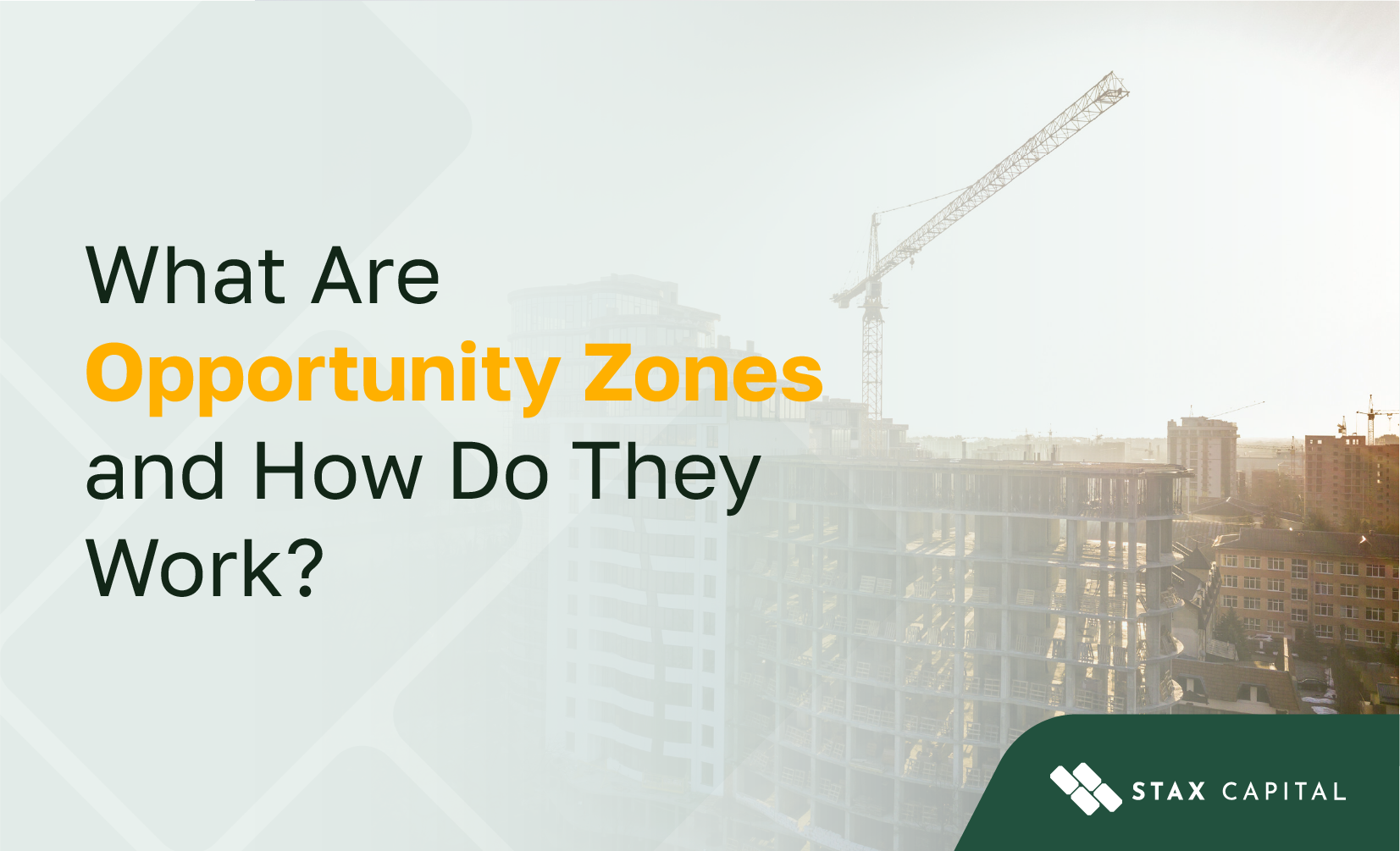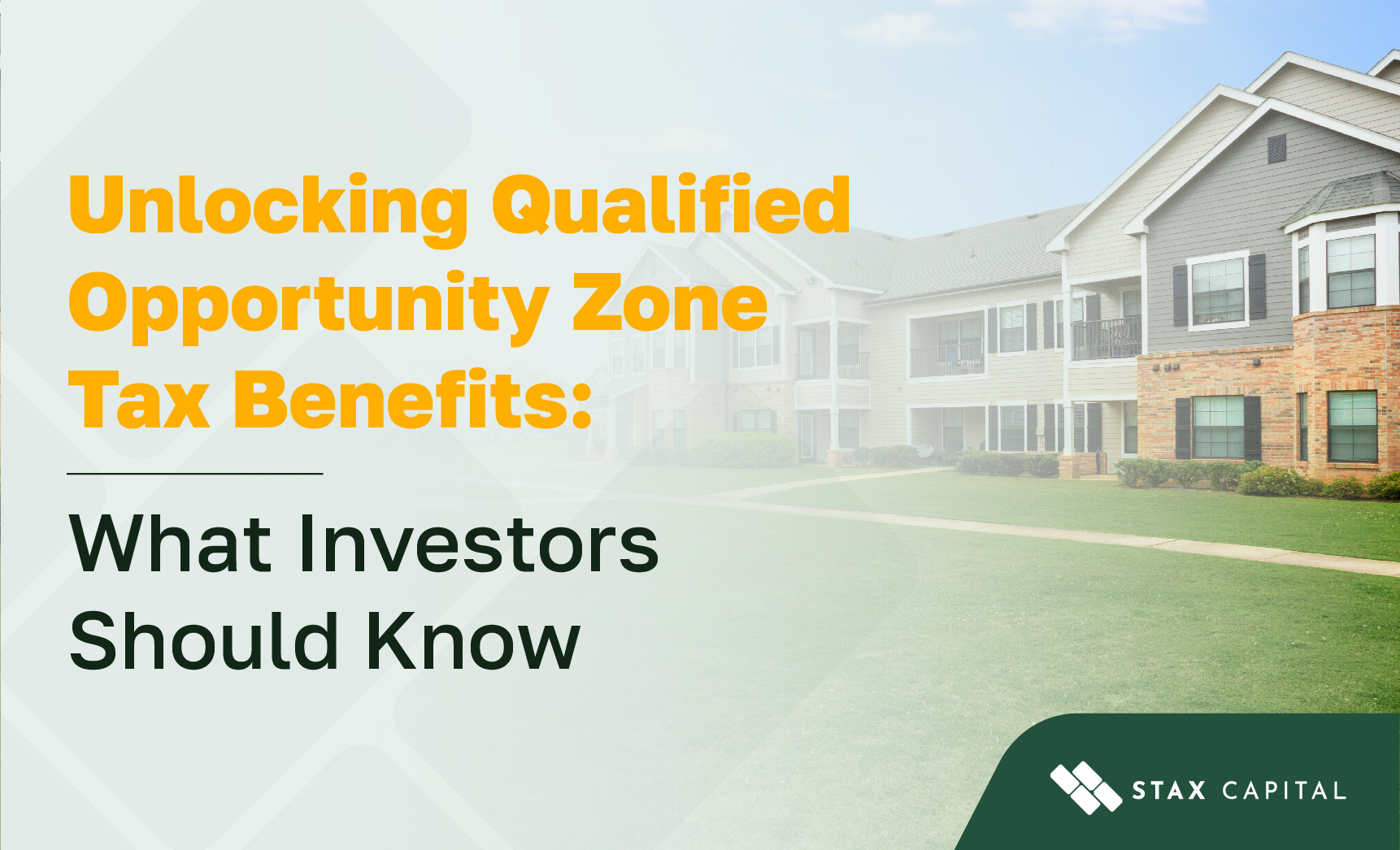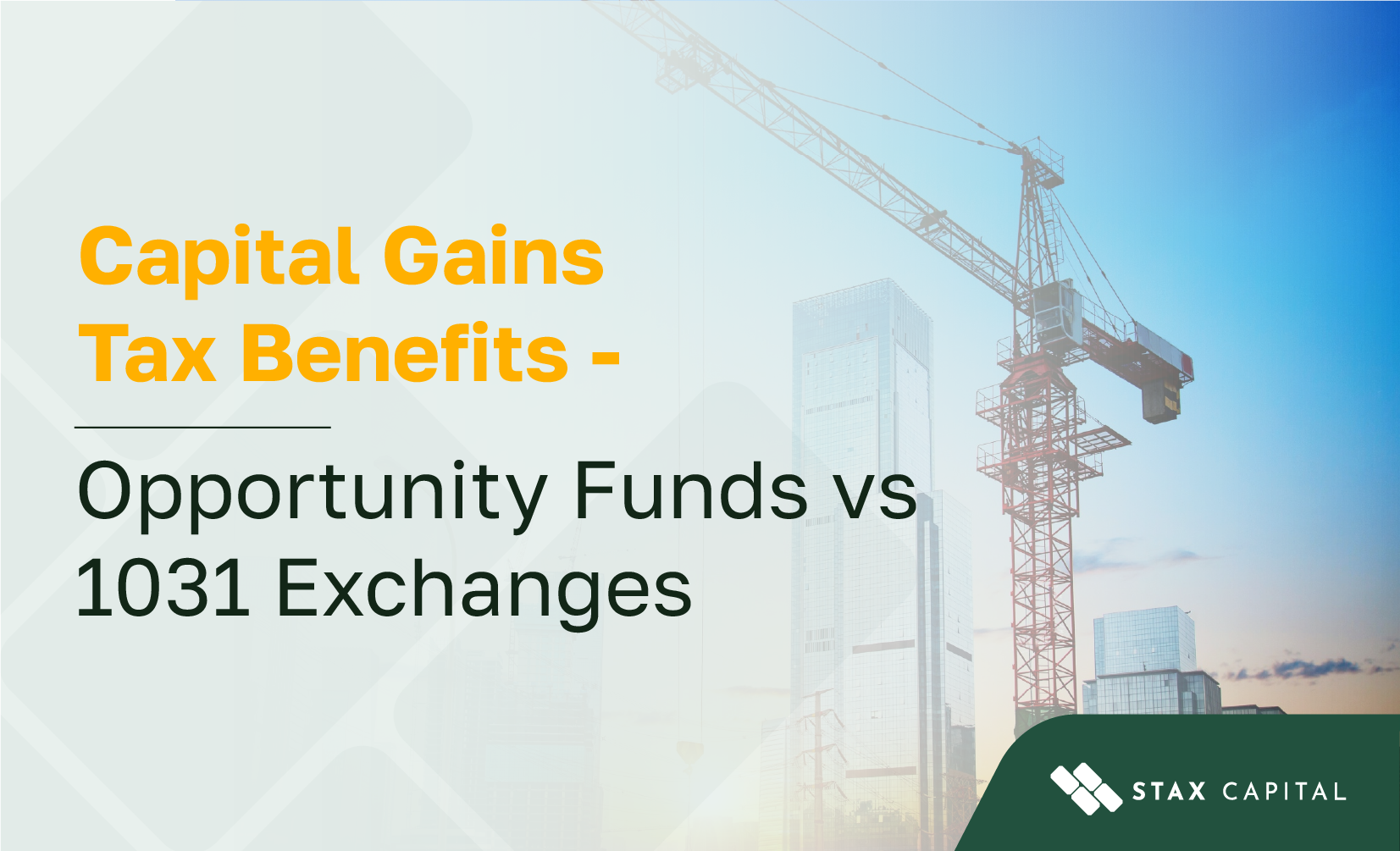Qualified Opportunity Funds: A simple guide

An alternative option that can be explored by real estate investors looking to diversify their portfolio and take advantage of possible tax benefits is the Qualified Opportunity Zone investment opportunity. What is a Qualified Opportunity Fund? It’s a vehicle for investing in these zones, offering potential tax advantages. Here are some of the important things to know about investing in Qualified Opportunity Zones through Qualified Opportunity Funds.
What is a Qualified Opportunity Zone?
The 2017 Tax Cuts and Jobs Act (TCJA) brought about the Qualified Opportunity Zone (QOZ) investment opportunity to encourage capital investments in economically distressed communities. These communities are usually nominated by a state, the District of Columbia, or a U.S. territory.
Qualified Opportunity Zones can be found in all 50 states, the District of Columbia, and 5 United States territories. The Internal Revenue Service (IRS) provides a list of the locations classified as QOZs.
The capital investments in these zones are expected to boost economic development and spur up economic activities. As an investor, you are not required to live in these specified zones; you only need to invest eligible gains in the QOZs and elect for tax deferral benefits.
What are Qualified Opportunity Funds?
Qualified Opportunity Funds (QOFs) are investment vehicles set up solely for Opportunity Zones Investing. Investments in Qualified Opportunity Zones through Qualified Opportunity Funds may be eligible for tax benefits. If you invest eligible gains in Qualified Opportunity Zones, you may be able to defer taxes on these gains.
You can make cash and non-cash investments, such as property, in a QOF. However, only qualifying investments may be eligible for tax deferral. In the case of property investment, the tax deferral would be limited to the basis of the property.
Qualified Opportunity Funds can be eligible partnerships or corporations, or Limited Liability Companies (LLCs) set up to operate as partnerships or corporations with respect to federal income tax as long as they are set up for substantial investment in QOZ properties. To qualify as a QOF, 90% of the eligible entities’ assets should be in Qualified Opportunity Zone property.
What are the eligible QOZ properties?
An eligible QOZ property can be either of the following:
A qualified ownership interest held by Qualified Opportunity Funds in a partnership or corporation operating as a QOZ business (a Qualified Opportunity Zone stock) or,
Eligible Qualified Opportunity Funds’ tangible property utilized for business in a QOZ.
The properties for Qualified Opportunity Funds or qualifying ownership interest in a QOZ corporation or partnership have to be purchased after December 31, 2017. Also, the qualifying ownership interest has to be acquired with cash exchange.
In order to qualify as a tangible Qualified Opportunity Zone business property, the property has to either be used by the Qualified Opportunity Fund or QOZ business for trade or business purposes. Additionally, the property’s original use should have started with the Qualified Opportunity Zone business or QOF, or it should have been substantially improved and used substantially for the Qualified Opportunity Fund or QOZ business purposes.
Certain entertainment properties and businesses located in QOZ, such as clubs, liquor stores, gambling facilities, etc., may not qualify for investments in Qualified Opportunity Funds.
What is the Qualified Opportunity Fund Tax Benefit?
The benefit received on a QOF-qualified investment depends on the time period with which it is held. The increase in the Qualified Opportunity Fund basis gets higher the longer you keep your investment.
For example, the basis for a QOF investment held for at least five years increases by ten percent of the deferred gain, the basis increases even further by an additional five percent if held longer, for at least seven years.
If you decide to dispose of your interest in a QOF after 10 Years and you opt to increase its basis to the fair market value on the date of disposal, you may be eligible for permanent gain exclusion on the sale or exchange.
Rules for QOF Tax Deferral Benefit
Eligible gains which include capital gains need to be invested within a given time period for gains to qualify for tax deferral. Also, these gains need to be invested for equity interest Qualified Opportunity Funds. Eligible gains from property sale qualify for deferral, given that they are invested in a QOF within the 180-day period from when the gain was made.
To elect to defer your capital gain, you do this through your federal income tax return. Eligible tax deferral of qualifying QOF investments is valid until the earliest of an inclusion event or until December 31, 2026.
An inclusion event for your qualifying investment in a QOF refers to situations when you terminate or reduce your investment by selling it or gifting it or through a liquidation of the Qualified Opportunity Fund.
When you decide to reduce or terminate your investment in Qualified Opportunity Funds, you would need to report the deferred gain on your tax return. This deferred gain at the time of inclusion would be determined by taking the lesser of your deferred gain or the QOF Investment’s fair market value and subtracting the basis in the Qualified Opportunity Fund Investment.
You also need to report any gain or loss on the disposal of your QOF investment. The gain or loss can be determined through the basis in the Qualified Opportunity Fund investment.
Pros of Qualified Opportunity Funds
The benefits of investing in Qualified Opportunity Funds include:
Impact Investment Opportunity: Investing in Qualified Opportunity Funds may be attractive to investors passionate about making social and economic impact in their environment as QOFs target economic development in distressed communities.
Flexibility on eligible gains: The gains to be invested in a QOF for tax benefits are not restricted to capital gains from property sale. Eligible gains could also include gains from investments such as stocks or bonds.
Investment portfolio diversification: Accredited investors looking to diversify their portfolio can utilize the QOF vehicle.
Capital gain deferral: Eligible capital gains, such as gains from property sale, can be deferred if reinvested in a Qualified Opportunity Fund.
Capital gain reduction: The step-up basis for investment in Qualified Opportunity Fund allows you to reduce the capital gain recognized on your interest in the QOF when sold or exchanged after at least five years of holding it.
Capital gain elimination: Capital gains of qualified investments in a Qualified Opportunity Fund may be eligible for total tax elimination when held for at least 10 years.
Cons of Qualified Opportunity Funds
Illiquid investment: Property investments through Qualified Opportunity Funds are relatively illiquid as there are no public markets for these alternative investment types. Interests in QOF may take significant time to sell than traditional investment types such as shares and bonds.
Time-bound benefits: To access the majority of the tax benefits from opportunity zones investing, you need to meet the time limits required. This kind of investment may be suitable for only long-term investors.
Also, the December 31, 2026 timeline for tax benefits means to be eligible for the seven-year 15% basis increase, an investment in a QOF must have been made by December 31, 2019.
Gains not guaranteed: As with other types of investments, there is no guarantee for gains on properties invested through a QOF either through returns or capital appreciation.
Legal risks: There could be changes to laws and requirements for tax benefits as regards investments in Qualified Opportunity Funds. There is, therefore, no certainty on any changes or extensions of these benefits’ deadline dates or requirements.
Non-qualifying investment: Making transfers or gifting your qualified investments in a QOF signifies an inclusion event and makes the investment non-qualified in the hands of the new owner. You would have to recognize any gains for tax purposes when this occurs.
How to Invest in Qualified Opportunity Funds
As a taxpayer, you would need to meet the 180-days rule by investing any capital gains within 180 days when your investment was sold, and gains realized. To ensure that you meet this requirement, it is recommended to locate a QOF opportunity beforehand and make all the necessary research and inquiries.
Investing in Qualified Opportunity Funds usually involves complex processes and requires significant investment knowledge, hence you may need the professional services of a chartered professional accountant or a tax expert. This helps you understand the underlying benefits as well as the risks involved.
You could set up your own QOF or invest through established Qualified Opportunity Funds. Established Qualified Opportunity Funds provided by investment firms would generally have an investment agreement specifying liabilities, rights and obligations, also they usually have requirements on minimum investment amounts and sizes. Also, these investment opportunities may only be available to accredited investors.
The QOF you choose to invest in would manage your investments and provide any periodic returns based on the portion of your investment and any other specifications outlined in your investment agreement.
Conclusion on QOFs
Qualified Opportunity Funds provide an alternative means of investing and diversifying through real estate property in Qualified Opportunity Zones. Qualifying investments in QOZ attract tax benefits; you can take advantage of these benefits if the necessary requirements are met.
Stax Capital specializes in providing access to Qualified Opportunity Funds. Our experience, coupled with our effective investment strategies, can help you access potential benefits through QOF investments. Find out more about our offerings on Qualified Opportunity Funds.



Share: